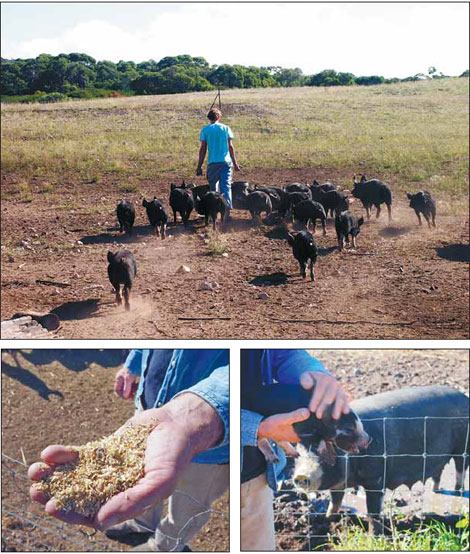Sheep, cattle ... pigs
Updated: 2012-05-06 07:44
By Han Bingbin (China Daily)
|
|||||||||||
|
Clockwise from top: Black piglets roam free in fenced grassy paddocks, are pampered and fed a mixture of wheat, peas and vegetables. Photos by Han Bingbin / China Daily |
Australia is known as a country with almost as many sheep as there are people. It is also increasingly well-known for its quality Wagyu beef. Han Bingbin discovers there is yet another meat that is attracting attention.
A decade ago, antiques dealers Warren Smith and Linda Smith bought a piece of land close to the pristine shores of Coffin Bay, Eyre Peninsula, South Australia, and started thinking: "Why don't we raise pigs?"
From that incidental brainwave, they started with three pigs, two sows and a boar.
Six years later, strictly adhering to their basic principles of rearing happy, healthy animals, their free-range pig farm is now at a whole new level. They currently have a total of 350 pigs, with four stud males and about 60 breeding females producing about 120 litters a year.
Their pork now retails all over Australia and it's proudly featured on the menus of high-profile local restaurants such as the Oysterbeds by Coffin Bay. In the Channel Seven show Mecurio's Menu filmed at their Minniribbie pig farm, their leg steaks was marinated, pounded and stuffed in a new recipe by celebrity chef Paul Mecurio.
Daily life at the Smiths' 225-acre (90 hectare) farm is a pastoral idyll. Black piglets closely follow their mothers as they roam free in large fenced grassy paddocks. They wallow happily in mud pools, and go home to fresh straw in their shelters.
They are Berkshire pigs, a famous heritage breed from England. The Smiths chose to breed Berkshire pigs because, unlike white pigs, they don't burn in the sun. Their bristles are black, but they have pink skin beneath. And underneath that pink skin is pale pink, moist meat.
The happy porkers are fed with a mixture of crushed wheat and peas, milled grain, seasonal fruits and vegetables. They are also allowed to graze and root naturally. The farmers do not add any chemicals such as growth hormones or feed additives. And the meat is preservative-free.
Most of all, the pigs all grow slowly at a natural space. Piglets stay with their mothers for a full eight weeks before being weaned, unlike intensive farming operations, where the piglets are often weaned at only three weeks and raised indoors, according to the Smiths.
To guarantee the quality of the meat, pigs are slaughtered at the appropriate ages. For example, pigs for fresh meat: at least 8 months old. For bacon: at least 13 months old.
Minniribbie Farm is fully licensed with accredited facilities, and the farm processes the pigs themselves after they are slaughtered in neighboring Port Lincoln. Among the products are leg roast and leg ham, which the Smiths make sure are cook-friendly.
The most popular leg roasts, for example, have a good layer of fat on them that renders down when cooking, keeping the pork moist and making the best crackling ever.
The meat itself has good marbling so that the pork stays tender and juicy after cooking.
The smoked and trimmed leg ham is cured using a 'secret' recipe and finally smoked over Australian red-gum wood. That process, the Smiths say, creates a beautifully unique taste that is a huge hit with customers, especially during Christmas.
While Minniribbie's free-range pork is sold all over Australia, the Smiths hope that customers can come down to their little farm in the heart of Eyre Peninsula to see the animals for themselves, and experience the whole green process.
Our Tasting Australia media team was fortunate. We were lucky to sit on the terrace of its cafe and taste the home-style cooking. The ambiance was perfect and the food fitted right in.
Pork chops were simply pan-fried and laid on a bed of green lettuce and rocket. Tender, well marbled and succulent to the point of "melting in the mouth," they were served with crisp, tasty crackling. It all reflected the animals' happy and healthy lifestyle.
It was then that I grew especially nostalgic. In my childhood days, my mother stir-fried pork at home and the whole kitchen was suffused with the fragrance of the meat. Often these days, the mass-produced animals we get taste of nothing at all.
But while I enjoyed the delicious pork at Minniribbie, I could not help but feel sad that only the meat is eaten at the moment. It seems that the internal organs are all discarded as there is still not a sustainable market for what we Chinese call the "delicious insides".
However, the Smiths are already aware that nothing should go to waste and they have their ambitions to market everything from snout to tail. Recently, they have been trying to build up a market for the bones. They smoke the pork bones for soup and many locals buy them.
As for those other parts that people haven't cared to try, the Smiths say: "It's all about education."
Contact the writer at hanbingbin@chinadaily.com.cn.
Today's Top News
Rescuers race against time for quake victims
Telecom workers restore links
Coal mine blast kills 18 in Jilin
Intl scholarship puts China on the map
More bird flu patients discharged
Gold loses sheen, but still a safe bet
US 'turns blind eye to human rights'
Telecom workers restore links
Hot Topics
Lunar probe , China growth forecasts, Emission rules get tougher, China seen through 'colored lens', International board,
Editor's Picks

|

|

|

|

|

|






